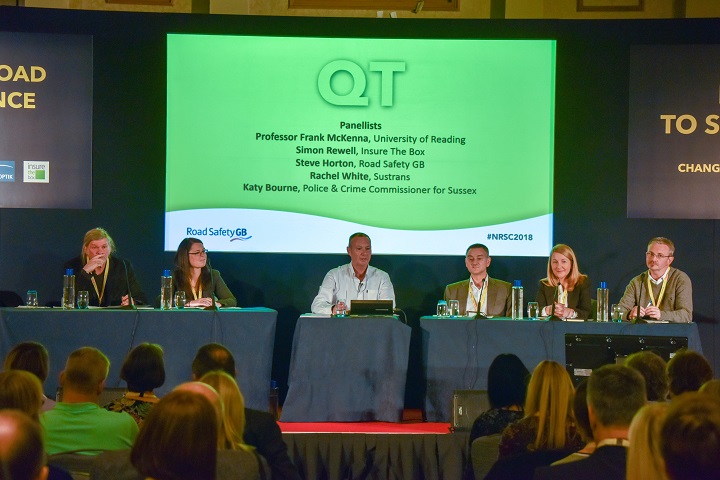
Coverage of the Question Time session at the 2018 National Road Safety Conference, which included questions about enforcement, mobile phones and 20mph speed limits.
Panellists:
- Professor Frank McKenna, University of Reading (FM)
- Simon Rewell, Road Safety Manager, Insure the Box (SR)
- Steve Horton, Director of Communications, Road Safety GB (SH)
- Rachel White, Senior Policy and Political Advisor, Sustrans (RW)
- Katy Bourne, Police & Crime Commissioner for Sussex (KB)
This page does not automatically refresh, click here to load the latest entries.
Which holds the most potential to reduce casualty statistics: vehicle safety, making roads safer, more roads policing or road user behaviour?
SH: road user behaviour – people make mistakes
KB: public fed up with lack of enforcement. People push the boundaries because they know they won’t get caught.
RW: making roads safer – from the point of view of pedestrians and cycling
SR: changing behaviour can be a long, uphill struggle. Quick changes – vehicle or road design.
Can we enforce our way to better road safety?
FM: We need to do it with the community. People hate points on their licence – over fines etc.
How do we move forward in road safety?
SH: Closing the gap between academia and practitioners
RW: In some areas, the evidence is already there. Being ignored over risk of upsetting people.
FM: Unless you’ve got evidence, don’t do it.
Use of mobile phones – should all phone use, including hands-free, be banned?
SR: Yes – but how do you enforce it? How does a police officer know the difference if a person is singing to themselves or talking on a hands free mobile phone?
KB: No, hands free should not be banned. More enforcement needed for hand held mobile phones. Public need education to make decision.
Comment from floor: hands free being legal makes the public think its safe
KB: You’re effectively taking away the right to have a conversation. Would welcome a discussion – but no need to go straight to legislation.
FM: Drivers using mobile phones causes harm to others.
Should we reduce the default speed limit in urban areas to 20mph?
RW: Short answer, yes. Bigger picture than just reducing casualty – does reduce speed. Has a huge effect on perceived safety – which makes more people cycle and walk.
SH: We all buy into the concept of reduced collision speeds. We should be upfront about why we use 20mph – active travel instead of road safety.
RW: Up to local authorities to look at whether appropriate. Cases where it works, cases where it doesn’t.
FM: You can redesign roads – narrower roads mean slower speeds. Work with communities – change the culture.
Comment from audience: Lack of enforcement undermining 20mph roads.
Black boxes – should they be used by more than just young drivers?
SR: Yes – we should be making it available to wider audience. To start with, felt like it would have a greater impact on younger driver & to an extent, has worked.
FM: Massive opportunity but first we must see how it reduces collisions – need to see the calculations directly. Then, black box insurance should be used by everyone.
Should we use the term accident?
SH: No – crashes are not an event without an apparent cause.
FM: It’s not obvious – positives and negatives.
Comment from floor – it’s very important to use the correct terminology. Need to be careful as professionals.
RW: Can link it to the ‘careless’ or ‘dangerous’ driving offences debate – language vastly important.
Do we need to increase traffic police alongside road safety targets?
KB: Yes we need more officers – and there is a pledge in Sussex to that. Enforcement is important.
SH: Fear of detection needs to be increased
FM: Certainty of detection changes people behaviour. Speeding is the only offence that has a reasonable chance of being caught – automatic speed cameras. Change of being caught is drastically low.
Comment from floor about how targets are not needed.
KB: Targets can drive poor behaviour
How can we improve in-car child safety?
SR: You can now buy car seats that evolve as a child grows. There will be an innovative response from manufacturers.
Comment on this story